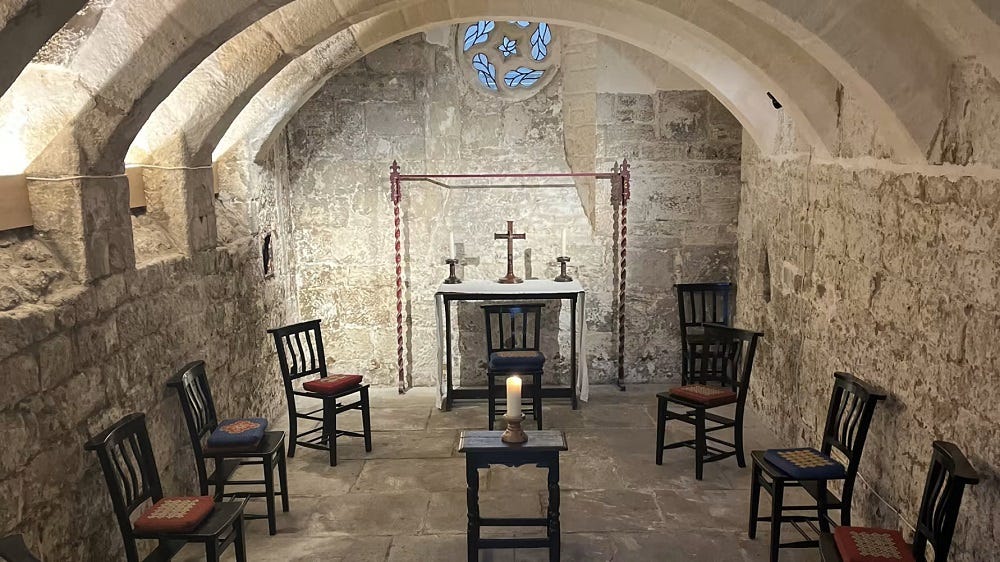'Tales from the crypt' create safe space for women
Women are 'slaying their demons' with pioneering Story Chair project set for national launch in Newcastle crypt
A group of women are crafting art and sharing stories to slay their demons and create a safe space to be themselves.
This is no everyday storytelling group, however, but a pioneering project centred on the use of narrative arts to help empower the women involved.
Story Chair is a collaboration between national charity Changing Lives and Northumbria University. It is supported by the North East Probation Service.
The project is designed to help women who are accessing the criminal justice system. Now, after proving itself in the region, the partners involved in delivering the pilot feel it is ready to roll-out nationally.
Over the last 12 months, more than 50 women from across Newcastle, Ashington, North Tyneside, and Sunderland have taken part in the eight-week programme.
“It’s a safe space,” said one of the women involved. “You can be safe here which is a good thing, especially for women like us who have suffered from domestic violence and other trauma.”
Another added: “We’ve talked in depth about really major things in our lives and then we can still have a laugh and be joyful.”
The women explored storytelling techniques through a series of workshops. The process is said to have enabled them to tell their own story and “take control of their own narratives”.
Beyond this, the programme explored how arts and cultural venues feel for the women, seeking lessons on how these places might be made more welcoming for those who might not feel represented in such spaces.
The programme looked at seven different ways to tell a story, but it was the first session – titled Overcoming the Monster – that proved the most resonant for the women.
“Sadly, the majority of the women were referencing the monster as being an ex-partner,” said Dawn Harrison, Changing Lives' service manager for criminal justice, Northumbria.
“All of the women used words such as ‘restricting’ and ‘consuming’ and the colours of the fabric chosen in their work were dark with many layers. Some had huge eyes but no other facial features. It was always a very powerful session.”
Harrison created the programme in partnership with Dr Angelika Strohmayer, an interdisciplinary researcher from Northumbria University's School of Design.
“Throughout the programme, women crafted alongside us, creating spaces for difficult conversations in a safe way,” Strohmayer said.
“An important lesson for me was how the women were encouraged to express their thoughts, emotions and experiences in alternative and hopeful ways, on their own terms.
“We have spent time together literally crafting infrastructures of inclusion, which we hope will be embraced and adopted by arts, cultural, heritage and community venues.”
The 'finishing touch', following completion of the programme, is the construction of a physical story-telling chair as a focal point of the women's stories.
It is composed of their artwork, and once complete will be used as a conversation-starter with cultural venues across the country.
Consider it a visual aid, on how they can be part of the story – and consider what they can do to make their spaces feel more inclusive. But there's more practical guidance on offer, too; courtesy of the lessons learned from this regional pilot.
Strohmayer added: “Informed by direct experience, we have developed a toolkit and are currently building a website where organisations will be able to download informative resources to support their own work on inclusivity and creative service delivery.”
The chair is being crafted from wood donated by the National Trust's Gibside Estate after one of its giant oak trees was pulled down in a storm. It will be unveiled during a launch event at Newcastle Cathedral in September.
“The crypt within Newcastle Cathedral plays an integral part in the journey as this is where the Story Chair programme was born,” Harrison said.
“Historically a small room that would have been used for people to come and say goodbye to the dead, following an invitation to visit the cathedral, the women were particularly taken with the idea of having a space to leave behind something, such as an old narrative which was no longer true or useful.
“The cathedral responded by investing in the space and welcoming the women to bring the chair back to continue its journey, a very clear statement which reinforces the cathedral’s ‘radical welcome’ and ensures the women’s stories are welcome there.”
She added: “We hope the launch event will support people to lean into sometimes difficult conversations about representation. The women supported by Changing Lives have every right to have their stories heard and should be supported to actively engage in their own history making.”
MC


